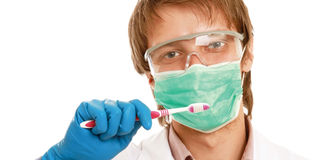Smelly breath: It's not your mask, it's you

Experts say a mask is not to blame for your bad breath. A mask makes one more conscious of his/her bad breath. Fotosearch
He sat at his desk in the corner office. He asked his colleague whether he was the only one who had noticed a change in his breath since he started putting on a mask.
“Have you noticed that when you breathe into your mask it smells gross. Is it my breath or the mask?” posed Bernard Otieno. “I’m sure you have also noticed.”
Otieno is not alone. A number of people have told HealthyNation that whenever they put on masks they noticed their breath has a foul smell, making them question their oral hygiene.
However, Dr Mark Wolff, a dentist and dean of the University of Pennsylvania’s School of Dental Medicine, said the mask was not to blame for the bad breath. However, in his report he said a mask made one more conscious of his/her bad breath.
Left over food
Dr Wolff, who has spent many years researching the reasons our breath can sometimes be stinky, said the smell was mostly caused by particles that remain in the mouth that were not washed off properly before one put on a mask.
The expert explained that our mouths are swimming in bacteria left over from the food we eat, and it hides between our teeth, under our gums, on the back of our tongue and in our sinuses.
There is also a natural bacteria that lives in our mouths all of the time. “This happens mostly when one puts on masks when their breath is probably a tad putrid and this is mostly noticed because we have begun exhaling into a covering that covers over our noses all the time,” he said.
He added: “It is the same as cupping our hands in front of our face to test our breath. It is there all the time. So, when we breathe, the moist air hits our masks. When the air evaporates, it leaves behind a bad stench.”
The bacteria, he said, eat away the mouth gums, causing the teeth to loosen and eventually fall out. Gum disease releases a sulphurous chemical, methyl mercaptan, that makes the mouth smell if not taken care of.
Good bacteria
Normally, the good bacteria balance the bad to form a healthy, odour-free ecosystem in your mouth.
Dr Vitalis Ogola, a leading dentist in western Kenya’s Royal dental clinic, explained that bad breath originated from three different sources including the nose, the stomach and the mouth.
While more serious problems like acid reflux and sinus infections may cause the bad smell, the most common source of halitosis — the condition of having unpleasant-smelling breath — can be cured by focusing on basic oral hygiene.
“Most of the time, this can be caused by the food we eat that is lodged deep into the pockets surrounding our gums. This can be taken care of by brushing your teeth in the morning and at night. The tongue is also an important area in the mouth to brush,” said Dr Ogola. “If you do not brush your teeth and the bumpy area on the back of your tongue every day, these bacteria will thrive and give you bad breath. Alternatively, if you are sick and your immune system cannot maintain the balance of good and bad, organisms will reproduce very quickly, spreading through your whole mouth.
This is the white coating on your tongue which appears in the tongue when one is unwell.”
He advised that where possible and where one can afford to before putting on a mask, they wash the mouth with a bacteria-killing mouth wash, such as Listerine, which is available locally.
Drink water
Popping in a breath mint before you put on a mask, he said, can be of great help. “Enjoying your gum can cover unwanted odour and actively fight the odour-causing bacteria. The stimulation of saliva, which happens with chewing gum, is responsible for diminishing the bad breath,” said the dentist.
Another way to put off the bad smell, he said, was by rehydrating. “Drinking a lot of water can be of help and will definitely improve your breath,” he said.
Dr Ogola advised that when the smell continues and there is no change, it is advisable to visit a dentist to identify the problem. “It could be a much bigger problem than just the smell,” he added.


